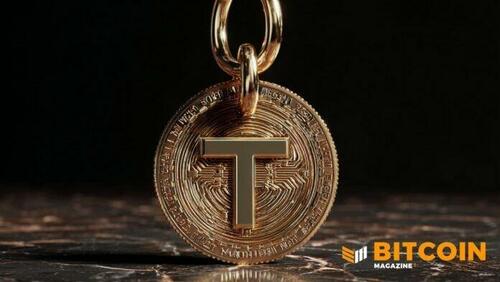Tether Launches USAT, A Federally Regulated, Dollar-Backed Stablecoin For The US Market
Authored by Micah Zimmerman via BitcoinMagazine.com,
Tether, the world’s largest digital asset company by stablecoin circulation, announced Tuesday the official launch of USA₮, a federally regulated, dollar-backed stablecoin designed specifically for use in the United States under the recently enacted GENIUS Act.
USA₮ is issued by Anchorage Digital Bank, N.A., a federally chartered U.S. bank and one of the first institutions approved to issue payment stablecoins under the new law, Tether said.
The launch marks Tether’s first stablecoin built to operate fully within the U.S. regulated financial system, following years of regulatory scrutiny around offshore-issued dollar tokens.
The debut follows the company’s announcement late last year detailing the token’s design and naming former White House Crypto Council Executive Director Bo Hines as CEO of Tether USA₮. With Tuesday’s rollout, USA₮ is now available to U.S. users seeking a dollar-backed token that complies with federal banking and stablecoin rules.
The GENIUS Act established the first nationwide framework governing stablecoins marketed to U.S. users, requiring full reserve backing, bank or qualified issuer status, and ongoing regulatory supervision. Under the law, offshore-issued stablecoins that do not meet these standards face restrictions across U.S.-regulated exchanges, banks, and payment platforms.
USA₮ is structured to meet those requirements. According to the company, Cantor Fitzgerald will serve as the stablecoin’s designated reserve custodian and preferred primary dealer, providing transparency and oversight of reserves from launch.
Anchorage Digital Bank will handle issuance, compliance, and on-chain settlement infrastructure.
Tether’s dominant role in the crypto spaceWhile Tether’s flagship USD₮ remains the most widely used stablecoin globally, its offshore structure limited its role in the U.S. market under the new law.
USA₮ allows Tether to maintain USD₮’s international dominance while offering U.S. institutions a regulated alternative tailored to domestic payment and settlement systems.
“This launch represents a new chapter for digital dollars in the United States,” said Paolo Ardoino, CEO of Tether.
“USD₮ has proven at global scale that digital dollars can deliver trust and utility. USA₮ extends that mission with a federally regulated product made in America.”
Bo Hines said the new stablecoin is aimed squarely at institutional users. “USA₮ is designed to meet federal regulatory expectations while delivering stability, transparency, and responsible governance,” he said. “It ensures the United States remains competitive in the evolution of digital money.”
During its initial rollout, USA₮ will be available on platforms including Kraken, Crypto.com, OKX, Bybit, and MoonPay, with additional U.S.-regulated exchanges and banking partners expected to follow.
According to bitcointreasuries.net, Tether holds 96,370 bitcoin, worth roughly $8.6 billion
Tyler Durden Tue, 01/27/2026 - 18:25

Recent comments